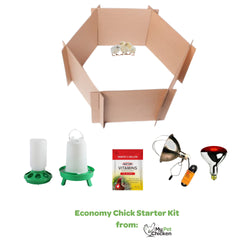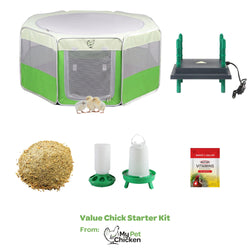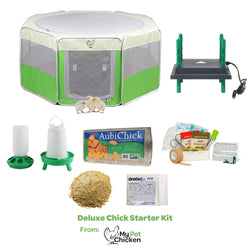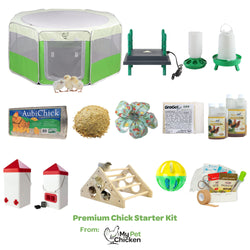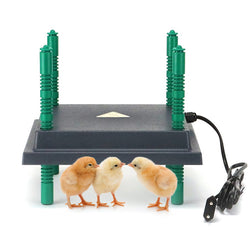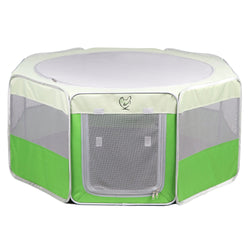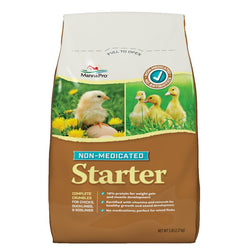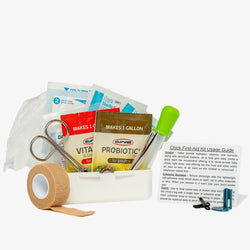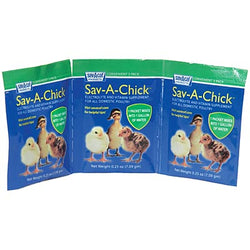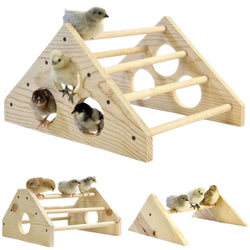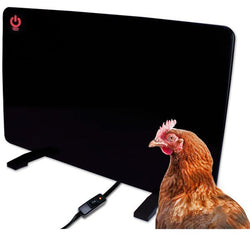How do I know if my chick died from Marek's disease?
Back to blog
You're not wrong to be upset at the loss of your pets, of course, but if you're upset at your hatchery for suggesting that deaths weren't related to Marek's disease or asking questions about your brooder set up, your anger is misplaced. Of course it's upsetting when your pets die! However, according to the Merck Veterinary Manual, Marek's Disease can develop in chickens as young as three weeks old, not younger. Since your chicks weren't even old enough to show the first symptoms, whatever they died from couldn't have been from Marek's, whether they were vaccinated, not vaccinated, badly vaccinated or dipped in honey. They are too young to have Marek's.
Remember, just because your chicks were vaccinated for one illness doesn't mean they will never get ill with anything. The Marek's vaccine only protects against Marek's disease, but there are many illnesses baby chicks can get. Rarely, even vaccinated chickens can get ill with Marek's disease.

Even so, your hatchery's recommendations to double check brooder conditions was a good idea, too. We do the same thing at My Pet Chicken: when someone is having a problem with continuing deaths and tells us that the chicks are at the "right" temperature, we ask them to double check to be sure. We ask them about bedding, sanitation, safety from breezes, feed, water and so on, just to make sure customers have done their research and are providing the right conditions. Occasionally people aren't responsible and don't read about proper chick care even when it's free on our website. For hatcheries that don't have as much free information as we do, the problem might be worse. Several times a year, we find that the "right" temperature, to some people, means room temperature, or about 70 degrees (way too cold!). Once we found out someone was trying to force feed their poor baby chicks with a syringe--aaack! Service personnel from hatcheries are seldom veterinarians, and can't diagnose an illness (even in the case of Marek's). What they can do is help you go over the basics, and ask good questions about your set up based on their years of experience with chicks and with customers who may be having problems. This can help you make sure the chicks' most important needs (including food, water, heat and a clean brooder) are being met. For in-depth medical advice and for a diagnosis of an illness in your flock, though, you will need to consult with a licensed avian vet.
But even if ignorance or inexperience is not an issue in your own losses, double checking everything is STILL a great idea. Asking customers to double check brooder conditions, at least at My Pet Chicken, has led some people to discover a malfunctioning thermometer, or to realize that the brooder was getting too hot in the sun during the day while at work.
A customer of ours a few years ago had raised chicks for 10 years with no problems, with her brooder set up the same each year. However, when she double checked as we asked her to, she realized that their revamping of the A/C system in their house meant that the brooder was now directly under a new vent. (Moving the brooder stopped her losses.) Another customer discovered on a double check that his feed had gotten moldy somehow. Yet another man recently realized that while he'd used the same medication for many years for his large batches of chicks, he was figuring the dosage WAY wrong for his new, much smaller waterer, and had overdosed his chicks by mistake. So, double checking the basics is always good. Keep in mind, too, that a request that you double check your brooder and share details is the only way service personnel from any hatchery have to help you determine what the problem might be, given that they can't personally inspect your set up.
So, are you right to be upset? Yes. Losing chicks is always a tragedy. But are you right to be upset at your hatchery? Probably not, based on what you have told us.
Remember, just because your chicks were vaccinated for one illness doesn't mean they will never get ill with anything. The Marek's vaccine only protects against Marek's disease, but there are many illnesses baby chicks can get. Rarely, even vaccinated chickens can get ill with Marek's disease.

Even so, your hatchery's recommendations to double check brooder conditions was a good idea, too. We do the same thing at My Pet Chicken: when someone is having a problem with continuing deaths and tells us that the chicks are at the "right" temperature, we ask them to double check to be sure. We ask them about bedding, sanitation, safety from breezes, feed, water and so on, just to make sure customers have done their research and are providing the right conditions. Occasionally people aren't responsible and don't read about proper chick care even when it's free on our website. For hatcheries that don't have as much free information as we do, the problem might be worse. Several times a year, we find that the "right" temperature, to some people, means room temperature, or about 70 degrees (way too cold!). Once we found out someone was trying to force feed their poor baby chicks with a syringe--aaack! Service personnel from hatcheries are seldom veterinarians, and can't diagnose an illness (even in the case of Marek's). What they can do is help you go over the basics, and ask good questions about your set up based on their years of experience with chicks and with customers who may be having problems. This can help you make sure the chicks' most important needs (including food, water, heat and a clean brooder) are being met. For in-depth medical advice and for a diagnosis of an illness in your flock, though, you will need to consult with a licensed avian vet.
But even if ignorance or inexperience is not an issue in your own losses, double checking everything is STILL a great idea. Asking customers to double check brooder conditions, at least at My Pet Chicken, has led some people to discover a malfunctioning thermometer, or to realize that the brooder was getting too hot in the sun during the day while at work.
A customer of ours a few years ago had raised chicks for 10 years with no problems, with her brooder set up the same each year. However, when she double checked as we asked her to, she realized that their revamping of the A/C system in their house meant that the brooder was now directly under a new vent. (Moving the brooder stopped her losses.) Another customer discovered on a double check that his feed had gotten moldy somehow. Yet another man recently realized that while he'd used the same medication for many years for his large batches of chicks, he was figuring the dosage WAY wrong for his new, much smaller waterer, and had overdosed his chicks by mistake. So, double checking the basics is always good. Keep in mind, too, that a request that you double check your brooder and share details is the only way service personnel from any hatchery have to help you determine what the problem might be, given that they can't personally inspect your set up.
So, are you right to be upset? Yes. Losing chicks is always a tragedy. But are you right to be upset at your hatchery? Probably not, based on what you have told us.
